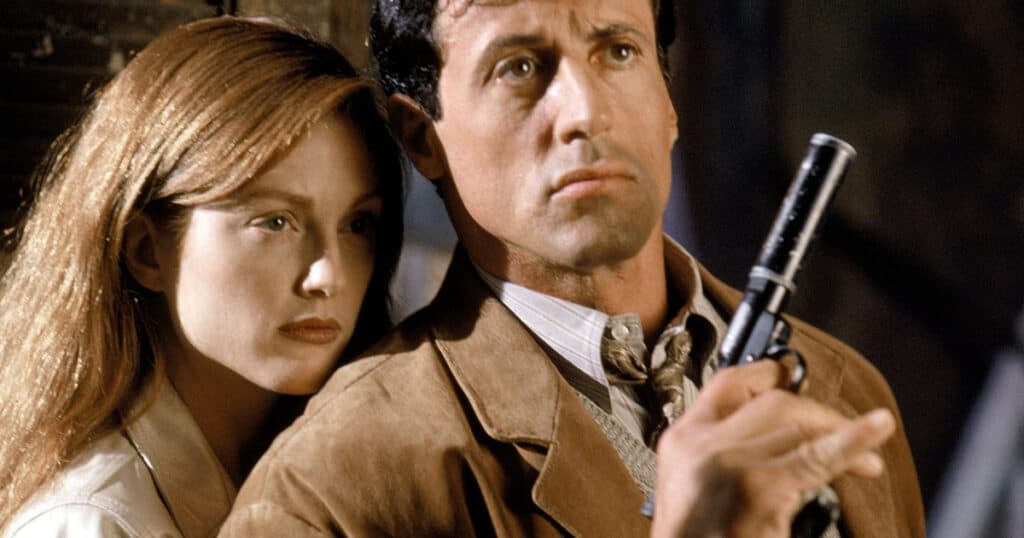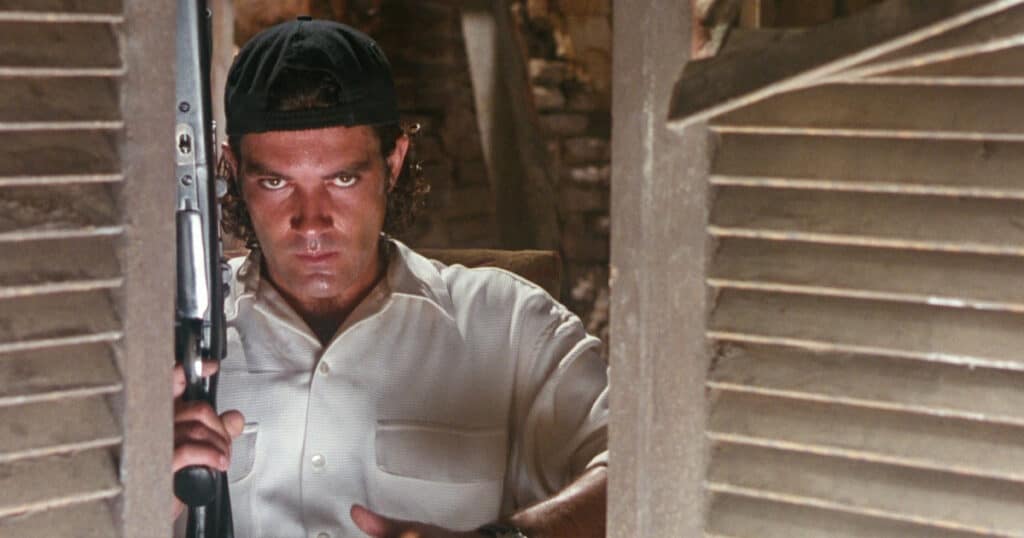All was not well with Sylvester Stallone’s career in the summer of 1995. Judge Dredd had come out, and, despite blockbuster business overseas, the film flopped in the all-important North American market. It would kick off a dry spell in Sly’s career, with many of his follow-up movies also doing poorly, to the point that in the early 2000s, he was stuck doing low-rent movies that went direct to video, such as Shade and Avenging Angelo. Of course, a major comeback for the Italian Stallion was just around the corner. Still, in this episode of Stallone Revisited, we look back at his follow-up to Judge Dredd, Assassins, which, on paper, should have been one of Sly’s classics but has gone on to become something of an obscure, underrated outing on his CV.
In the 1990s, spec scripts were all the rage. For those who don’t know, a spec script is when a writer completes an entire screenplay and sells it to a major studio. In the nineties, writers like Shane Black and Joe Eszterhás sold their completed scripts for The Long Kiss Goodnight and Basic Instinct for millions of dollars. For a brief period, screenwriters became rock stars, and the Wachowskis, before they ever directed a frame, became two of the hottest writers in town when they sold not one but two spec scripts to mega-producer Joel Silver for a million bucks apiece. One was The Matrix, and the other was Assassins. Back in the nineties, Assassins was considered the commercial screenplay, with The Matrix as the risk, but indeed, this one became a pricey flop, despite seeming like a home run on the page.
Indeed the script had many interested parties, with Mel Gibson, then the king of action at Warner Bros, initially interested in both directing and starring in the film. Alas, he was too busy with Braveheart, passing it along to Richard Donner, his favourite colleague and himself something of an icon having directed the Lethal Weapon movies. The screenplay centred around a deadly game of cat and mouse between two rival hitmen, the older, experienced Robert Rath and the wild, deadly upstart, Miguel Bain. At some point, every prominent male actor in Hollywood had their name in contention, with the Wachowskis maintaining that the part of Rath had been designed for Sean Connery.

The idea was to make this a star-packed two-hander, and indeed, in 1995, the two leading men, Sylvester Stallone and Antonio Banderas, were likely seen as a can’t-miss prospect. At the time, Stallone was coming off of Cliffhanger and Demolition Man. Banderas’s star was still rising, with his hit Desperado opening just a few months before Assassins finally did. Stallone and Banderas got along famously well and loved the director, Richard Donner. Plus, they had rising star Julianne Moore playing the love interest. What went wrong?
If you read Richard Donner’s authorized biography, he admits to a few things going wrong. For one thing, he didn’t hit it off with the Wachowskis, who had written a graphically violent script Donner had no interest in turning into a film – begging the question – why was he hired in the first place? He brought in Brian Helgeland to do a significant rewrite which would make Stallone’s Robert Rath a much more likable person, and, in a fatal move, he excised most of the action in favour of turning the film into more of a neo-noir rather than a high voltage action movie. He wanted to put out a movie featuring one of Stallone’s best-ever dramatic performances, proudly telling interviewers that in this one, Stallone would only kill two people and only save his life – begging the question – why make Stallone a hitman? Indeed, Donner toyed with the idea of making Robert Rath a cop, proving that, in the end, the director didn’t mesh with the material and tried too hard to turn it into something it was never meant to be.
Indeed, in Donner’s book, it’s mentioned that in post-production, all involved realized they had made a dull film, which is why the original score by Michael Kamen got ditched at the eleventh hour in favour of a more action-driven score by Mark Mancina. The film was a box office flop, making under $30 million, and indeed, when it opened, the trades were full of stories about how Sly’s star power had dimmed.

So how does the movie hold up? While many people watching this series have written me to say they were looking forward to this episode, I never really liked Assassins as a movie. The late Richard Donner is one of my favourite directors. Still, he was not immune to misfires, and his effort to make a classy thriller out of what was always written to be a gum-chewing action b-movie goes wrong right off the bat with its pretentious, dull staging. Stallone dials it down A LOT – too much so – to play the world-weary hitman, and I remember, as a child, watching this, wishing that Stallone would lighten up a bit. His chemistry with the excellent Julianne Moore isn’t there; she felt shoehorned in with her role as a hacker being targeted, with only Sly to protect her.
That said, the movie does have one significant saving grace – and it’s Antonio Banderas. Despite being new on the scene, Banderas goes all out as far as scenery-chewing goes, and if the movie has a pulse at all, it’s because of him. His wild, over-the-top performance has given birth to many internet memes, and he’s the one that emerged from the film with his star power intact, with him signing on to do The Mask of Zorro not long after. Interestingly, Donner, in his later years, said that If he could do the film over again, he would have switched the roles, with Sly playing the bad guy and Banderas playing the hero – which – to be honest – might have been a lot better.
In the end, it’s pretty apparent why Assassins flopped because even though it was marketed as an action flick, it was a psychological thriller, precisely the type of film Stallone’s fans, at the time, didn’t want to see him in. One would think its failure would have driven Sly back to his action-driven comfort zone, but his next film, Daylight, would be another attempt to stretch, with disaster movies, at the time, being red hot at the box office. Sadly, its release would miss the trend by just a few months, but that’s a story for another time!


















Follow the JOBLO MOVIE NETWORK
Follow us on YOUTUBE
Follow ARROW IN THE HEAD
Follow AITH on YOUTUBE